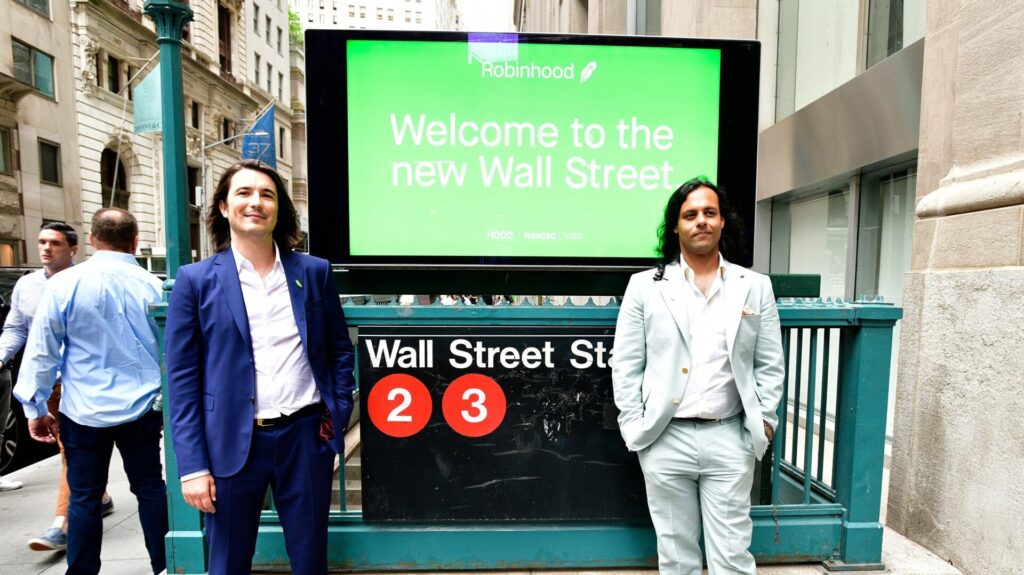Robinhood has ceased the rollout of its sports betting product following a request by the Commodity Futures Trading Commission (CFTC). The stock trading company geared at individual investors had been jumping headfirst into sports betting with its Pro Football Championship market, looking to capitalize on the rapidly growing demand for pure degeneracy.
It was only a few years ago that Robinhood—which was central in the pandemic-era memestock frenzy—faced substantial criticism from legislators and the public alike over concerns that its sleek app encouraged short-term investing with features like notifications that alerted users to stock price fluctuations and confetti that covered the app whenever users placed a trade. The company has made some changes to its product in the intervening years, and introduced products like a retirement IRA and credit card.
Most financial experts advise individuals, sometimes referred to as “retail investors,” to invest with a long-term mindset by purchasing index funds that track the stock market and allow them to appreciate over the years. Individuals typically do not make money day trading individual stocks, whereas the U.S. stock market has consistently appreciated in value over recent decades, making it a largely safe bet to invest in a basket of stocks that reflects the entire market.
The ironic thing about Robinhood’s foray into sports betting is that retail investors have long been stigmatized as inexperienced novices simply gambling away their money, trading on vibes rather than fundamental conviction. Robinhood was not doing them any justice by inserting an actual gambling product into its app.
“While we continue to work with the CFTC to understand their concerns, we are suspending the rollout of the Pro Football Championship market,” Robinhood said in a statement on its blog. “We have rolled this product out to roughly 1% of our customers, and for those who already placed trades, we plan on providing the option to close their positions or take them to resolution.” The CFTC warned Robinhood the product might be illegal under current statutes. The company, for its part, has argued that gaming bets should be allowed because the market has shown demand for them.
As sports betting has quickly become legalized throughout several states thanks to a 2018 Supreme Court ruling, companies like DraftKings have been able to rake in billions of dollars from individuals looking to make a quick dollar by placing small bets on the outcomes of games. While the public was generally supportive of allowing sports betting initially—it was happening underground, and therefore legalizing it made some sense—sentiment has started to turn in online communities. On X, many people have begun to deride sports betting, saying it has ruined the carefree joy of sports entertainment as people put their own money on the line, making for a tense atmosphere and heated emotions when bets go sideways.
Exact numbers are hard to come by, but the U.S. sports betting market was estimated to bring in $14 billion in 2024, up from $11 billion the prior year. The games, as with all gambling, are rigged in favor of the house.
The Commodity Futures Trading Commission (CFTC) has formally requested that Robinhood Derivatives, LLC (RHD) “not permit customers to access” sports event contracts.
While we continue to work with the CFTC to understand their concerns, we are suspending the rollout of the Pro…
— Robinhood Comms (@RobinhoodComms) February 4, 2025
Some dark stories have only added to concerns about online sports betting. The Athletic last year published a story about a veteran who gambled away his life after becoming addicted to sports betting and finding himself digging a progressively deeper hole as he tried in vain to win back his losses. Exotic bets like parlays offer tantalizing potential jackpots but are incredibly complex and hard to win, only encouraging even more reckless behavior; companies like DraftKings draw players back to their apps with offers of free money to place on new bets. The whole story could have been ripped straight from “Uncut Gems.”
The idea that Robinhood would place a person’s investment portfolio, essentially their nest egg, next to the roulette table feels unwise, especially considering the addictive nature of the activity. Hopefully, if Robinhood does proceed with a rollout of its betting markets, it will think about designing it thoughtfully. Many critics think, however, that it simply should not be legal to gamble anywhere from the convenience of one’s smartphone.
Of course, some of this comes down to personal responsibility, but Robinhood should also take care to thoughtfully design its app so users are protected from harming themselves. The company settled in 2021 with a family whose son died by suicide after he mistakenly believed his account balance was negative $730,000 after trading options and being unable to reach Robinhood support regarding the issue. The parents said Robinhood was at fault for luring inexperienced investors to take big risks in sophisticated financial instruments without providing the necessary customer support and investment guidance.







